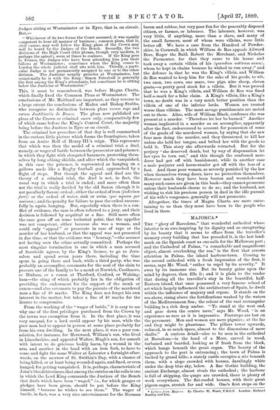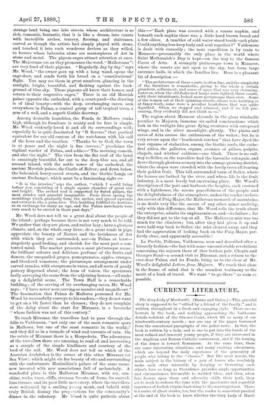MAJORCA.*
THE " glory of Barcelona," that wonderful cathedral whose interior is so awe-inspiring by its dignity and so enrapturing by its beauty that it seems to efface from the traveller's memory every building that has preceded it, is the last land- mark on the Spanish coast as one sails for the Mallorcan port ; and the Cathedral of Palma, " a remarkable and magnificent object, almost overlooking the sea," is the first that arrests attention in Palma, the island harbour-town. Coming to the second cathedral with a fresh impression of the first, it seems, says Mr. Wood, " rather to repel by its severity." It awes by its immense size. But its beauty gains upon the mind by degrees, then fills it; and it is plain to the reader that during all the traveller's stay in the beautiful, half- Eastern island, that once possessed a very famous school of art which largely influenced the architecture of Spain, he dwelt within the influence of majesty and repose. It stands on the sea-shore, rising above the fortifications washed by the waters of the Mediterranean Sea; the colour of the vast rectangular building is a rich deep amber. " To stand at the west end, and gaze down the centre nave," says Mr. Wood, " is an experience as rare as it is impressive. Footsteps are lost on the pavement. Men and women are mere pigmies ; at the far end they might be phantoms. The pillars tower upwards, reduced, in so much space, almost to the dimensions of mere shafts." A curious detail—also to be seen in the cathedral at Barcelona—is the head of a Moor, carved in wood, turbaned and bearded, looking as if fresh from the block, which hangs beneath the great organ. The beauty of the approach to the port is entrancing ; the town of Palma is backed by grand hills ; a stately castle occupies a site beneath them, with a slope crowded with houses, dazzlingly white under the deep blue sky, below. A fine Gothic building, the ancient Exchange, almost rivals the cathedral ; the harbour is full of shipping, the quays are crowded, there is plenty of work everywhere. The flat-roofed houses, with their great pigeon-cages, stretch far and wide. One's first steps on the
• Letters from Majorca. By Charles W. Wood, F.R.G.S. London : Richard Bentley and Son.
strange land bring one into streets whose architecture is so rich, romantic, fantastic, that it is like a dream, into courts with incredible arches, tracery, flooring, and staircases, carved as though the artists had simply played with stone, and touched it into such wondrous devices as they willed, to houses whose balconies alone are masterpieces of Art in stone and metal. The pigeon-cages attract attention at once.
The Majorcans (or, as they pronounce the word, " Mallorcans ") are very fond of their pigeons. " Regularly, day by day," says Mr. Wood, " the owner goes up with a long wand, opens the cage-door, and sends forth his brood on a constitutional' flight. You may see them in great numbers, glancing in the sunlight, bright, beautiful, and flashing against the back- ground of blue sky. These pigeons all know their homes, and return to their respective cages." There is an old Moorish palace opposite the cathedral, with a court-yard—the drawing is of ideal beauty—with the deep, overhanging eaves, seen everywhere in Palma, a central group of tall tropical trees, a gem of a well, and a superb Gothic doorway.
Among desirable hostelries, the Fonda de Mallorca ranks high, although its furniture is scanty and its fare is simple. Mr. Wood evidently loved it and all its surroundings well; especially he is quite fascinated by " D Sereno," that poetical equivalent for our old custom of the watchman with his call of the hour and the weather. " Thanks be to God, the town is at peace and the night is fine (serene)," proclaims the vigilant warder of Palma, and adds,—" The morning cometh, and also the night." The view from the flat roof of the hotel is amazingly beautiful, far out to the deep blue sea, and all around inland, with the noble tower of the cathedral, the ancient Moorish palace, the Castle of Belver ; and down below,
the balconied, heavy-eaved streets, and the Gothic Lonja (or ancient Exchange), which must be a fascinating sight:— "It is the interior," says the author, "which I would bring before you, consisting of a single square chamber of great size and height. The arched roof is supported by fluted pillars, the most slender and graceful imaginable. From these spring the mouldings which gradually form the arches, and spread upwards and outwards like a palm-tree. This building fulfilled its destinies as an exchange for many an age, and the Palma merchants were very much to be envied in those past days."
Mr. Wood does not tell us a great deal about the people of the island ; perhaps because there is not very much to be told. We gather that they are pious, and rather lazy ; have a glorious climate, and, on the whole, easy lives ; do a great trade in pigs, appreciate the beauty of Nature and the lavishness of Art with which they are surrounded, are—in Palma at least— singularly good-looking, and cherish for the most part a con- tented mind. The market presents a most picturesque scene; the brilliant colours and delicious perfume of the fruits and flowers, the unequalled grapes, pomegranates, apples, oranges, and blood-red tomatoes ; the picturesque arrangement under carved arcades, with evergreens in vases, and all sorts of gaudy pottery dispersed about ; the hum of voices, the spectators lazily surveying the scene from the adjoining houses,—all make up a delightful scene. The Town Hall is a remarkable building ; of the carving of its overhanging eaves, Mr. Wood says : " I have never seen carving so massive and magnificent."
The fascination that Palma de Mallorca possessed for Mr. Wood he successfully conveys to his readers,—they do not want to get on a bit faster than he chooses ; they do not complain of the delay about the start for Miramar, in a barouche " whose fashion was not of this century."
To reach Miramar, the travellers had to pass through the hills to Valdemosa, "not only one of the most romantic spots in Mallorca, but one of the most romantic in the world ;" and they did so in a tornado of wind and torrents of rain. On the estate of Miramar there is a Hospederia. The adventures of the travellers there are amusing, to read of, and interesting as a sample of the simple kindliness and courtesy of the lord of the soil. Mr. Wood does not tell us which of the Austrian Archdukes is the owner of this other Miramar (or Sea View), which might vie for beauty of site and surrounding with the unfortunate Maximilian's palace of the same name, now invested with new associations full of melancholy. A wonderful place is this Mallorcan Miramar, with sea, sun- shine, rocks, trees, cliffs, streams, forests of ferns, its marvel- lous terrace, and its poor little monastery, where the travellers were welcomed by a smiling young monk, and beheld with truly British dismay the preps rations for the community's dinner in the refectory. Mr Wood is quite pathetic about this :—" Each plate was covered with a coarse napkin, and beneath each napkin there was a little hard brown bread and a few olives. A tumbler of cold water stood beside each plate. Could anything less keep body and soul together ?" Valdemosa is dealt with cursorily ; the next expedition is by train to Manacor—presumably the only place in the world where Saint Methusaleh's Day is kept—on the way to the famous Caves of Arta. A strangely picturesque town is Manacor, where the courts are not open to the sky, but form large entrance halls, in which the families live. Here is a pleasant bit of description :—
"The architecture of these courts is often fine, and the simplicity of the furniture is remarkable, giving to the whole a certain grandeur, refinement, and sense of space that was very charming. Later on, when the old-fashioned lamps were lighted, these courts, with their inhabitants, looked more picturesque than ever. Some of the women sat at their spinning-wheels, others were knitting or at fancy-work, some wore a peculiar head-dress that was quite dignified. Often we stopped and admired, and if we felt pre- suming, they evidently did not think us so."
The region about Manacor abounds in the giant windmills peculiar to Majorca, immense six-sailed constructions which look in the twilight like great flying creatures with outspread wings, and in the silver moonlight, ghostly. The plains and
caves of Arta arouse the enthusiasm of the writer; but he is very severe upon the " heathenish torches " that have dyed the vast expanse of stalactites, among the Gothic roofs, the cathe- dral aisles, the galleries, organs, avenues of pillars, pulpits, chapels, and witches' caldrons—one black. There is no rail- way to Soller, so the travellers had the barouche out again, and drove through glorious scenery into the orange-growing district, where the slopes were crowded with the lovely trees all bearing their golden fruit. This hill-surrounded town of Soller, where the houses are bathed by the river, and whose life is the fruit industry, is a most lovely but enervating place. Mr. Wood's description of the port and harbour, the heights, each crowned with a lighthouse, the serene peacefulness of the people, and the delightfulness of the atmosphere, makes the reader envious. An ascent of Puig Major, the Mallorcan monarch of mountains, is no doubt very like the ascent of any other minor acclivity, only with this difference, that Mr. Wood tells the truth about the enterprise, admits its unpleasantness, and—its failure ; for
they did not get to the top at all. The Mallorcan mist was too much for the climbers ; but, after they had given it up and were half-way back to Soller, the mist cleared away, and they had the aggravation of looking back on the Puig Major, per-
fectly clear, and apparently accessible !
La Puebla, Pollensa, Valdemosa, seen and described after a leisurely fashion—the last with some uncomfortable revelations concerning the sojourn there of that lawless pair, Chopin and Georges Sand—a second visit to Miramar, and a return to the ever-dear Palma and its Fonda, bring us to the close of Mr.
Wood's delightful Letters from Majorca. We reach that close
in the frame of mind that is the soundest testimony to the merit of a book of travel. We want " to go there " as soon as
possible.



































 Previous page
Previous page